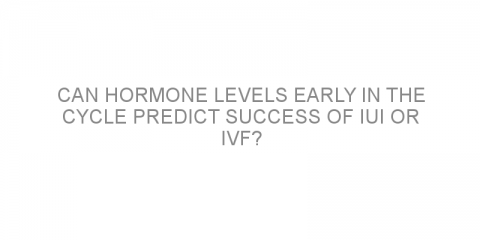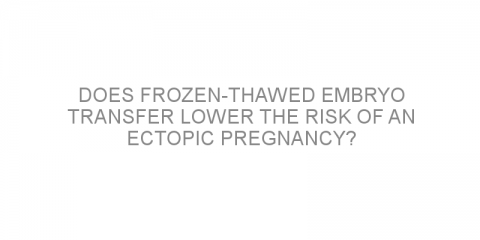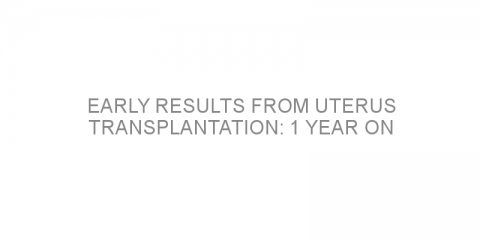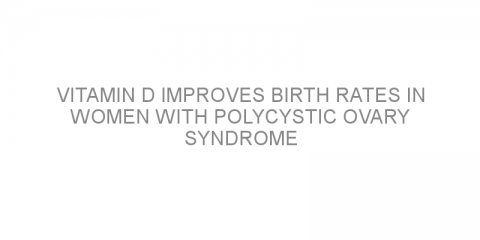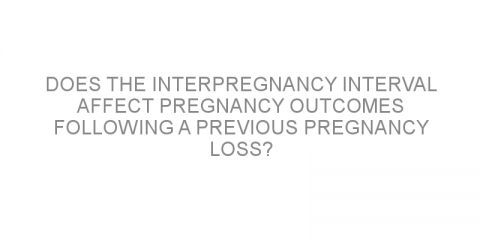In a nutshell This study investigated the connections between fertility issues in women and pregnancy outcomes in patients who needed help to conceive, and in patients who conceived naturally. The time it takes to get pregnant was identified as an important risk factor for poor pregnancy outcomes. Advanced maternal age, and maternal obesity also had...
Read MoreInfertility Posts on Medivizor
The effects of maternal weight on fertility and pregnancy outcomes in IVF patients
In a nutshell This study investigated the connections between maternal weight and pregnancy outcomes in in vitro fertilization (IVF; the egg is fertilized by sperm in a dish, and is then implanted into the uterus). The study found that being underweight had a limited impact on pregnancy and live-birth rates, but was associated with increased risk...
Read MoreCan hormone levels early in the cycle predict success of IUI or IVF?
In a nutshell This study examined whether follicle stimulating hormone and estradiol levels affected live birth rates after assisted reproduction methods. This study determined that women who initiated infertility treatment with high levels of follicle stimulating hormone (FSH) and estradiol levels were unlikely to achieve live birth through...
Read MoreDoes ovarian hyperstimulation syndrome have an effect on child heart function?
In a nutshell This study assessed the heart function of children born to mothers who had experienced ovarian hyperstimulation syndrome (OHSS), which is a complication of assisted reproduction procedures. The authors found that children born to women who had experienced OHSS had poorer heart function compared to other children. Some background...
Read MoreDoes frozen-thawed embryo transfer lower the risk of an ectopic pregnancy?
In a nutshell This study compared the effects of frozen embryo transfers against fresh embryo transfers in women undergoing in vitro fertilization (IVF). The frozen embryo transfers significantly reduced the risk of ectopic pregnancy. Some background Couples who are trying to get pregnant often turn to assisted reproduction methods such as IVF (a...
Read MoreExamining the timing and administration of GnRH antagonists during IVF
In a nutshell This study examined the timing of gonadotropin-releasing hormone (GnRH) antagonists during in vitro fertilization (IVF) treatments. Authors concluded that a modified early GnRH protocol achieves similar outcomes to the GnRH agonist protocol with a shorter overall treatment duration. Some background IVF is a complex process which...
Read MoreAn overview of treatment options for inducing ovulation in polycystic ovary syndrome
In a nutshell This review analyzed current evidence on the most effective approach to achieve mono-ovulation (one egg released) or ovulation in general in women with polycystic ovary syndrome (PCOS). Authors reported good safety and effectiveness for a number of treatment options for PCOS. These should be individualized wherever possible. Some...
Read MoreEarly results from uterus transplantation: 1 year on
In a nutshell This study examined clinical outcomes of uterus transplantation in 7 women with absolute uterine factor infertility (AUFI). Researchers reported continued menstruation and blood flow to the uterus 1 year after uterus transplantation. Any rejection episodes were detectable early on and treated successfully. Some background...
Read MoreVitamin D improves birth rates in women with polycystic ovary syndrome
In a nutshell This study explored the impact of vitamin D on women with polycystic ovary syndrome (PCOS) who were having ovulation induced (a procedure which encourages egg production to improve the chances of pregnancy). The study concluded that pregnancy outcomes were connected with vitamin D levels. Some background Nearly 10% of women of...
Read MoreDoes the interpregnancy interval affect pregnancy outcomes following a previous pregnancy loss?
In a nutshell This study explored the effects of a short interpregnancy interval (IPI) between a pregnancy loss and another successful pregnancy. The study concluded that there were no adverse pregnancy outcomes resulting from a very short IPI. Some background Pregnancy loss occurs in about 10-15% of pregnancies, mainly around the ten week mark....
Read MoreDoes the father’s age affect outcomes of intra-cytoplasmic sperm injection?
In a nutshell This study investigated how paternal age affects the outcomes of intra-cytoplasmic sperm injection (ICSI). Researchers reported an effect of paternal age on the number of high-quality embryos, but not on other pregnancy outcomes, following ICSI. Some background The effect of the mother’s age (maternal age) on pregnancy has been...
Read MoreLow vitamin D levels increase the risk of early miscarriages during the first trimester
In a nutshell This study investigated low vitamin D levels as a risk factor of early miscarriages. Researchers reported that low vitamin D levels increased the risk for miscarriage during the first trimester, but not during the second trimester. Some background Miscarriage is reported to occur in about 12 to 20% of pregnancies. There are a...
Read More
